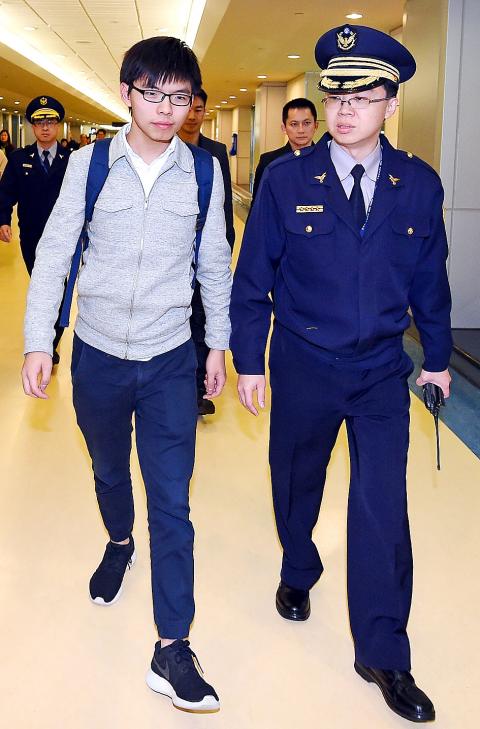Following an uneventful arrival in Taiwan on Saturday night, Hong Kong democracy campaigner Joshua Wong (黃之鋒) yesterday spoke to a group of Taiwanese students in Taipei about his involvement in the territory’s struggle for self-determination.
Wong was escorted by police at Taiwan Taoyuan International Airport after disembarking, and his speech was marked by a heavy police presence, although there was no protest of any kind.
Wong and three Hong Kong lawmakers, Edward Yiu (姚松炎), Nathan Law (羅冠聰) and Eddie Chu (朱凱迪), were confronted by a group of pro-unification protesters on their arrival at Taoyuan Airport on Jan. 7, with protesters attempting to break a police cordon to attack the four, who were invited to participate in forums organized by the New Power Party.

Photo: Chu Pei-hsiung, Taipei Times
Wong said he was more confident in the Taiwanese police force’s investigation efficiency than in their Hong Kong counterparts.
Only four people were arrested for attacking Law at Hong Kong International Airport on Sunday last week, while 13 people were arrested in Taiwan for attempting to attack Wong and the three pro-localization lawmakers, he said.
Wong said he had not taken any special measures to prevent more conflict with protesters and had only asked the event organizer to attend to his safety.
The event — organized by a think tank affiliated with the Democratic Progressive Party (DPP) — was to familiarize college students with cross-strait political and economic interactions.
Wong and DPP Department of Youth Development director Huang Shou-ta (黃守達) held a discussion about democratic development in Taiwan and Hong Kong.
Wong told dozens of students how “Chinese factors” influenced Hong Kong politics and about his participation in the movement against a pro-China national education scheme in 2012, the “Umbrella movement” in 2014 and the Hong Kong legislative election last year.
“I hope Hong Kong and Taiwan, both subject to the suppression and interference of Beijing, can seek more interactions especially in terms of the political participation of young people,” Wong said.
“It is my first time speaking to a group of students and assistants to lawmakers in Taiwan. I hope I can engage people other than lawmakers and political leaders in Taiwan in the future, including college students of my own age,” he said.
Such interaction is common between democratic societies, Wong said, adding that he would continue to attend similar events.
He said his trip to Taiwan was also to familiarize young Taiwanese with the plight faced by three other Hong Kong lawmakers and himself.
The four might be deprived of their seats in the territory’s Legislative Council for altering their oaths during the swearing-in ceremony, he said, adding that their fate hinges on a court verdict expected next month.
The four could be asked to pay legal expenses of up to HK$10 million (US$1.29 million) should they be disqualified, he said.
“Taiwanese who support democracy and human rights hopefully pay attention to events in Hong Kong,” he said.

‘ABUSE OF POWER’: Lee Chun-yi allegedly used a Control Yuan vehicle to transport his dog to a pet grooming salon and take his wife to restaurants, media reports said Control Yuan Secretary-General Lee Chun-yi (李俊俋) resigned on Sunday night, admitting that he had misused a government vehicle, as reported by the media. Control Yuan Vice President Lee Hung-chun (李鴻鈞) yesterday apologized to the public over the issue. The watchdog body would follow up on similar accusations made by the Chinese Nationalist Party (KMT) and would investigate the alleged misuse of government vehicles by three other Control Yuan members: Su Li-chiung (蘇麗瓊), Lin Yu-jung (林郁容) and Wang Jung-chang (王榮璋), Lee Hung-chun said. Lee Chun-yi in a statement apologized for using a Control Yuan vehicle to transport his dog to a

Taiwan yesterday denied Chinese allegations that its military was behind a cyberattack on a technology company in Guangzhou, after city authorities issued warrants for 20 suspects. The Guangzhou Municipal Public Security Bureau earlier yesterday issued warrants for 20 people it identified as members of the Information, Communications and Electronic Force Command (ICEFCOM). The bureau alleged they were behind a May 20 cyberattack targeting the backend system of a self-service facility at the company. “ICEFCOM, under Taiwan’s ruling Democratic Progressive Party, directed the illegal attack,” the warrant says. The bureau placed a bounty of 10,000 yuan (US$1,392) on each of the 20 people named in

The High Court yesterday found a New Taipei City woman guilty of charges related to helping Beijing secure surrender agreements from military service members. Lee Huei-hsin (李慧馨) was sentenced to six years and eight months in prison for breaching the National Security Act (國家安全法), making illegal compacts with government employees and bribery, the court said. The verdict is final. Lee, the manager of a temple in the city’s Lujhou District (蘆洲), was accused of arranging for eight service members to make surrender pledges to the Chinese People’s Liberation Army in exchange for money, the court said. The pledges, which required them to provide identification

INDO-PACIFIC REGION: Royal Navy ships exercise the right of freedom of navigation, including in the Taiwan Strait and South China Sea, the UK’s Tony Radakin told a summit Freedom of navigation in the Indo-Pacific region is as important as it is in the English Channel, British Chief of the Defence Staff Admiral Tony Radakin said at a summit in Singapore on Saturday. The remark came as the British Royal Navy’s flagship aircraft carrier, the HMS Prince of Wales, is on an eight-month deployment to the Indo-Pacific region as head of an international carrier strike group. “Upholding the UN Convention on the Law of the Sea, and with it, the principles of the freedom of navigation, in this part of the world matters to us just as it matters in the